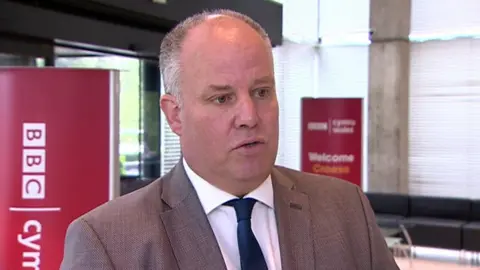Post-Brexit EU aid warning from First Minister Carwyn Jones
 Thinkstock
ThinkstockIt would be unacceptable if EU aid is replaced by a Westminster-run system, First Minister Carwyn Jones has warned.
He said a regional funding scheme which left unelected officials in Whitehall to make investment decisions would be a "betrayal of devolution".
UK ministers are working on a shared prosperity fund to replace EU funds for the poorest areas after Brexit.
Sources in the UK government said it would be best if Welsh ministers worked constructively on a replacement scheme.
As one of the poorer parts of the European Union, Wales will have received more than £5bn in so-called structural funds by 2020.
First awarded in 2000, the money was hailed as a "once-in-a-generation opportunity" by the then first minister Rhodri Morgan.
The West Wales and the Valleys region continued to receive the highest level of aid because productivity - calculated as Gross Value Added (GVA) - remained below 75% of the EU's average GVA.
With the money set to come to an end after the UK leaves the EU, the Welsh Government will publish a report on Thursday outlining its ambitions for a successor scheme.

Its document, Regional Investment in Wales after Brexit, calls on the UK government to "make good promises made in the EU referendum campaign to ensure Wales is not a penny worse off as we leave the EU".
Ministers in Cardiff Bay are calling for the money Wales receives annually from EU structural funds - roughly £370m - to be allocated to the Welsh Government's budget "as a minimum".
But the document said it would not be the Welsh Government's intention "simply to replace existing EU programmes by other means".
The paper notes that the ability to create a new system, unconstrained by current EU limitations, could be "a potential benefit" after Brexit.
"We will no longer need to separate parts of west and east Wales artificially, or address the needs of rural areas, people, and businesses entirely separately," the document said.
Officials in Westminster are currently working on the details of a shared prosperity fund - a Conservative manifesto commitment for the June 2017 general election.
As it stands, Welsh Government departments administer the structural funds.
The document from Wales states: "We explicitly and vigorously reject any notion of a UK centralisation of regional economic development policy, including the creation of a Whitehall managed 'UK prosperity Fund'.
"It would be irresponsible for the UK government to try to bypass the established partnerships and structures that we have built up over 20 years and any effort to do so would result in disruption, incoherence and effectiveness.
"The Welsh Government will not agree simply to administer funds where critical decisions are made in Whitehall," the paper said.
It also called for the creation of a "council of economic ministers" from all four UK nations to ensure co-ordination of policy.

The UK government's Wales Office said it was premature to start talking about successor programmes given the progress of the Brexit negotiations.
Westminster sources also expressed frustration that they were not consulted on the Welsh Government's document, despite repeated calls from ministers in Cardiff Bay to be involved in the Brexit talks.
The leader of the Welsh Conservatives said it would be best for officials in Westminster to run the replacement programmes - going further than comments he made after the EU referendum.
Andrew RT Davies said: "I think what's important is that whatever fund comes out of our withdrawal from the European Union it has greater success than what European funds have had to date.
"It's important that the communities that will benefit from structural funds get a say in how those funds are run and, importantly, as much money as possible is made available to those communities to become economically more prosperous.
"And I believe that on a UK footprint that's best administered where the priorities can be set and obviously from the UK Treasury the money can be allocated.
Asked about whether the EU funds Wales currently receives will be replaced, Mr Davies added: "There's every potential that if it's administered on a UK basis that Wales could actually get more."
